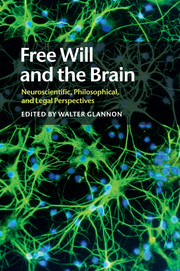Book contents
- Free Will and the Brain
- Free Will and the Brain
- Copyright page
- Contents
- Preface
- Contributors
- Part I Introduction
- Part II Conceptual issues
- 2 Is free will an observer-based concept rather than a brain-based one? A critical neuroepistemological account
- 3 Evolution, dissolution and the neuroscience of the will
- 4 The experience of free will and the experience of agency: an error-prone, reconstructive process
- Part III Mental capacities and disorders of the will
- Part IV Neural circuitry and modification of the will
- Part V Legal implications of neuroscience
- Index
- References
2 - Is free will an observer-based concept rather than a brain-based one? A critical neuroepistemological account
from Part II - Conceptual issues
Published online by Cambridge University Press: 05 October 2015
- Free Will and the Brain
- Free Will and the Brain
- Copyright page
- Contents
- Preface
- Contributors
- Part I Introduction
- Part II Conceptual issues
- 2 Is free will an observer-based concept rather than a brain-based one? A critical neuroepistemological account
- 3 Evolution, dissolution and the neuroscience of the will
- 4 The experience of free will and the experience of agency: an error-prone, reconstructive process
- Part III Mental capacities and disorders of the will
- Part IV Neural circuitry and modification of the will
- Part V Legal implications of neuroscience
- Index
- References
- Type
- Chapter
- Information
- Free Will and the BrainNeuroscientific, Philosophical, and Legal Perspectives, pp. 27 - 43Publisher: Cambridge University PressPrint publication year: 2015

